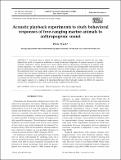Acoustic playback experiments to study behavioral responses of free-ranging marine animals to anthropogenic sound
Abstract
Growing concern about the effects of anthropogenic sound on marine life has highlighted the need for empirical methods to study behavioral responses of marine animals to specific acoustic exposures. Some effects have been discovered by observing coincidence of effects with sound exposure, e.g. beaked whales such as Ziphius cavirostris and Mesoplodon densirostris may mass strand during sonar exercises. Sometimes new activities trigger precautionary concern, such as the potential effects of deep water seismic surveys on deep-diving endangered species, e.g. sperm whales Physeter macrocephalus. In both cases, the best way to prove that a particular sound stimulus causes a behavioral response involves experiments whereby a specific dose of sound is broadcast to an animal and the acoustic exposure and behavioral responses of the animal are measured. The present paper argues for a balance of experimental and observational studies of effects of sound on marine life, designed so that each kind of study complements the other.
Citation
Tyack , P L 2009 , ' Acoustic playback experiments to study behavioral responses of free-ranging marine animals to anthropogenic sound ' , Marine Ecology Progress Series , vol. 395 , pp. 187-200 . https://doi.org/10.3354/meps08363
Publication
Marine Ecology Progress Series
Status
Peer reviewed
ISSN
0171-8630Type
Journal article
Collections
Items in the St Andrews Research Repository are protected by copyright, with all rights reserved, unless otherwise indicated.

